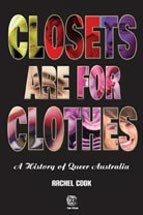Closets are for Clothes, a History of Queer Australia by Rachel Cook

Black dog books, 2010. ISBN 978 1742031040.
Published in black dog book's The Drum series, this title adds
significantly to the literature available at secondary level outlining
the history of homosexuality in Australia. Beginning with the First
Fleet, an overview of each historical period is given, showing the
activity within that time frame. Each chapter relates its history and
then adds to the bare facts with letters, epistles and stories of
individual people. Many of these are real people, but some are
fictionalised first person accounts, giving a sound authenticity using
the facts from the times. So in the first chapter, A New World, White
Settlement of Australia, the facts are presented in a text format
giving the reasons for the First Fleet and what it represented for
Australia. Interspersed are stories of individuals, such as Rebecca
Cooper, Arthur Palls, Robert Pringle Stuart (a magistrate) and Lt
Charles Bowen. Each story relates a differing point of view.
Little is known about the nineteenth century, so much of the text is
devoted to the late twentieth century when attitudes were polarized.
World War 2 made quite a difference to gay men and women, but it seems
that once over, things went back to the way they had been. During the
50's and 60's, the medical profession came to view homosexuality as an
illness, and the book outlines the 'cures' used over the world. In
Australia, aversion therapy was used widely, and it is salutary to read
of the attempts made using this barbaric treatment.
The 60's saw an upswing in movements for freedoms across the board, and
the gay community stood up to be counted, resulting in demonstrations,
arrests and threats. The onset of AIDS, Mardi Gras, the call for
equality before the law, and so on are covered briefly in this book
A comprehensive index, glossary and time line, reference guide and
acknowledgments accompany the book, making it an indispensible aid to
studies at senior level. It makes salutary reading to realise that
although things have changed, many of the attitudes remain the same and
that there are still battles to be fought and won.
Fran Knight